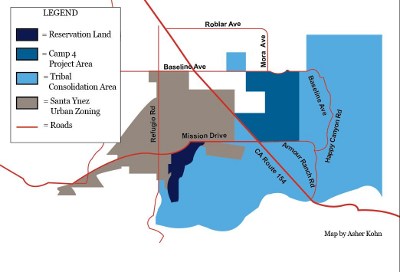The California Second District Court of Appeal has sided with the Coastal Commission against organic farmers accused of damaging habitat on a ridge above Topanga Canyon. In a January 24 ruling, the Second District refused to block cease and desist and restoration orders issued by the Commission to property owners Stefan, Kathryn and Rahel Hagopian.
The court's decision rested mainly on its finding that, despite a rule drafting process begun in 1982, the Coastal Commission has never approved a Local Coastal Plan for the Santa Monica Mountains area of Los Angeles County, nor had it provided interim permitting authority to the county.
Further, it held the Commission had no duty to delegate interim powers to the county under Public Resources Code Sec. 30600.5 where the county did not meet the statutory prerequisites.
The court rejected the Hagopians' claim that Los Angeles County gave itself authority to approve permits for that area in a 1989 ordinance.
Further, the court refused to order the County and Commission to agree on an LCP. It found the Commission did not have a duty to ensure the county adopted an approved local coastal program; the county "cannot be compelled" to adopt an LCP that the Commission will approve; and the county had no duty to seek interim permitting authority under Sec. 30600.5.
At issue are three stunningly situated mountaintop parcels, owned by Stefan and Kathryn Hagopian and, in part, Rahel Hagopian. Stefan and Kathryn, an osteopath and doctor, are described in a 2010 Los Angeles Times article as operators of Skyline Organic Farms, an organic and biodynamic farm founded in 1991.
Whether or not the Hagopians farmed conscientiously, the Coastal Commission alleged that they cleared and developed land without coastal development permits in an environmentally sensitive area of live oak woodland and chaparral. It says in 2007 they sought a permit exemption to build a guest house and in response were invited to apply for a coastal development permit. They then created vineyards, several county-permitted structures, a pool, tennis court and solar array while continuing to argue they did not need Commission approval -- or not beyond permissions granted by a prior owner's 1987 homebuilding permit on one parcel.
The Second District opinion quotes Commission members during a 2010 public hearing as accusing the Hagopians of "ongoing "massive commercial development" ... without Commission approval, resulting in "wholesale destruction" and "mountain top removal" reminiscent of "West Virginia coal mining." "
The trial and appellate courts rejected the Hagopians' allegations of due process violations. They also rejected claims that the work on the property fell within an agricultural exemption, saying such claims were not raised at the 2010 Commission hearing. The 2010 Commission staff report is here.
But the extra layer of regulation that so frustrated the Hagopians may not continue much longer. Los Angeles County is moving toward qualifying to assume coastal permitting authority by at last securing Commission approval for a complete Santa Monica Mountains LCP. The Board of Supervisors will consider a draft LCP was scheduled to hear a draft LCP today. Dennis Slavin, chief deputy director with the L.A. County Department of Regional Planning, said staff had been working steadily for the last "two-plus years" to complete the current proposal, whose land use component was approved by the supervisors in 2007. He said the county had been working intensively with biologists to make protection choices for the most environmentally sensitive errors and with the Coastal Commission staff in Ventura to create a package the Commission could accept.
Slavin said there was "no direct relationship" between the Hagopians' case and the LCP process. As for the court decision, he said, "That's pretty much how the county felt all along."
The case is Stefan Hagopian, et al., v. State of California, Case No. B240688, available at http://www.courts.ca.gov/opinions/documents/B240688.PDF .

